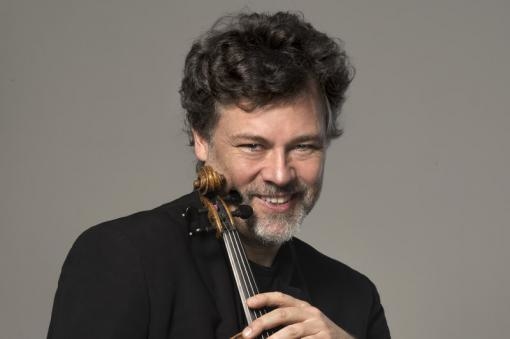The programme of this year's Concentus Moraviae festival presents an unprecedented cross-section of more than twenty Czech and foreign string quartets. The exceptional violinist, composer, professor of the Royal Northern College of Music in Manchester, UK, and the long-time first violinist of the Škampa Quartet, Pavel Fischer, was asked by publicist Lukáš Pavlica to give an interview.
Which part of the programme of this year's season would you never want to miss?
If time allowed me to, I would definitely like to go and listen to the Navarra String Quartet, which was formed at The Royal Northern College of Music in Manchester, where I currently teach. They have always been vigorous and lively players. I would also be attracted by the Prezioso Quartet, they caught my attention because of their interesting programme. Estonian music would be something completely new to me. It is also adorable that quartets of renowned names, such as the Jerusalem Quartet, Borodin Quartet, Szymanowski Quartet, as well as the Talich and Haas Quartets, arrived to the venue.
However, you would most likely be tempted to get to know less known quartets, wouldn't you?
Yes, for example the Auner Quartett. I heard Mendelssohn rendered by them once and was impressed with their youthful, energetic and modern sound. It was simply different than the tradition goes. I like that distinctive trait. So I would recommend this quartet with a light heart. I would send those listeners who prefer the mainstream and want to know the "foundation stone" of quartet literature, to see the London Haydn Quartet specializing in playing period instruments.
Which participation of foreign or Czech quartets at the festival do you consider the greatest success of the organizers?
In terms of prestige, it is certainly the Borodin Quartet, because their tradition is linked to the Smetana generation. Of course, nowadays they are completely different four musicians, but it is undoubtedly a famous ensemble and it enhances the reputation of the festival.
And what do you say about their concert programme?
Beautiful! This is one of the shows I would definitely love to go to. Also partly for personal reasons because I love Prokofiev's 2nd String Quartet. Against the first one, which is more intellectual, the second one is more intuitive, more rustic and more based on folk music, which goes hand in hand with the theme of national schools at the festival.
I personally was pleased by Shostakovich's 9th String Quartet being included in their programme. I am glad that the performers did not make a sure bet by choosing the beautiful, but perhaps too frequently performed, eighth quartet.
It is generally a good thing that the most famous pieces by the composers such as Dvořák and the like are not necessarily played throughout the festival. From Dvořák there is his String Quartet No. 11 in C major, which is played really seldom. And I'm glad I don't see the American Quartet everywhere or Schubert's Death and the Maiden.
Which programme do you personally find the most interesting and which, on the contrary, you could imagine might be a little better? And do you miss a composition or a particular ensemble in the programme?
From the point of view of national schools, I was quite surprised that Bedřich Smetana would not be played here at all. On the other hand, Smetana is so famous and frequently performed that I partly understand this. Well, and regarding performers, I am not really missing anyone. However, if I were to choose the ensembles that I would like Czech listeners to hear, then it would be the Carducci Quartet and The Elias String Quartet. As far as I know, they have never performed in the Czech Republic. Certainly an interesting ensemble is the Cuarteto Q-Arte, which will perform a string quartet by Alberto Ginastera, which is a compositionally extremely interesting composer who is not afraid to use unconventional sound ideas.
Where, in your opinion, the specific sound of each individual ensemble is born?
I think that the characteristic sound stems from the sum of the respective individualities. There are four players in every quartet, each of them has a specific sound, and during the first year or two of playing together, everything is yet to be sorted and frequently there are also opinion disputes. If they endure and if those people are capable and determined, then in two years the sound will settle down. Basically, it is the intersection of four individuals, from which a new sound is created. And that is the soul of a particular quartet. The second thing is then belonging to some school or tradition. For Czech quartets, for example, it was their melodious, very warm and lyrical concept, where emphasis was put on the beauty of sound.
Have you ever come across a festival abroad that would present, in a similar way as Concentus Moraviae, a comparable number of string quartets? In your opinion, is this a more frequent or rather unique project from the point of view of the international scene?
There are not a lot of such festivals, but in Amsterdam, for example, there is the amazing Strijkkwartet Biennale festival, which is similar in this respect and features world-class ensembles. Good festivals also exist in Heidelberg or Canada, there is the so-called Banff Centre International String Quartet Festival. Therefore yes, such festivals do exist, but it is a unique initiative in this country. And I have to pay my respects to the organizers because of all those ensembles they managed to engage in the festival.
The whole interview of Lukáš Pavlica was created in cooperation with the Harmonie magazine, where you can also read its full version.
































No comment added yet..